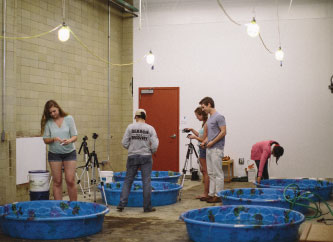Mountaintop Mentor - Murray Itzkowitz

Faculty mentor, Murray Itzkowitz went into this summer intrigued by the educational model at Mountaintop in which the boundaries between faculty and students blur allowing for research collaborations that will prepare students for the "real world."
Murray Itzkowitz, department chair and professor of biological sciences, is an evolutionary biologist who studies the theoretical aspects of social behavior. His interest in the endangered Leon Springs Pupfish of West Texas was triggered when he inherited a ranch near Big Bend National Park along the border between Texas and Mexico.
For the past 15 years, Itzkowitz and his students have spent summers studying the mating habits of the pupfish in the 100-degree-plus West Texas heat. Alarmed by the decline in the pupfish’s population as well as its habitat, the group has applied for and received several grants from the Texas Fish and Wildlife Department. The group’s efforts are paying off, as the pupfish population has begun to rebound.
At Mountaintop this summer, Itzkowitz’s students are observing pupfish in wading pools whose temperature, salinity and light exposure replicate as nearly as possible the conditions that prevail in the cienegas, or rare and isolated desert marshlands where the Leon Springs pupfish lives. By controlling these and other critical variables, the group hopes to learn which environment best promotes the pupfish’s mating and, thus, its chances for survival.
Here, Itzkowitz shares his thoughts on Mountaintop and the opportunities it is providing his students.
What are your thoughts in general about Mountaintop? What is the value it holds for students at Lehigh?
I have always been amused that many people separate their time at a university from what comes after- “the real world.” I’m not sure what is meant by a “real” or “unreal” world, but I think the common knowledge is that the university curriculum is composed of material that is largely unimportant after graduation. It is not surprising that online courses are the current fad when so many believe that university courses are just a bunch of lectures and exams. To further diminish the university education, we often hear that successful people have talents that do not require a university education, e.g., intelligence, interest, and the ability to form creative collaborations. But are these successful people really unique? With the new space available at the Mountaintop, Lehigh is testing the idea that these skills can be learned, nurtured, developed and ready for use at the time of graduation. Judging from my group, I see students using their already well-developed academic skills to understand complex problems. I see them developing communication skills that allow unique ideas to be heard, vetted and tested. Perhaps because of their project “ownership,” I also find them to be enthusiastic and hard-working. If Lehigh can expand this experience, I think we will provide students with a unique and important educational opportunity. When students leave here, the “real world” they will soon experience will be pretty much what they experienced at Lehigh.
How did you get involved with this project and these students?
I got involved for two reasons: First, Lehigh provided me with an opportunity to expand my research on the conservation of a highly endangered desert species fish found in West Texas. Second, I was intrigued by an educational model in which the boundaries between faculty and students blur, by allowing students to become research collaborators while faculty serve more in the role of a mentor. I thought it was a worthwhile education experiment to see how or if creative collaborations among students could enhance or even replace the lecture-test paradigm.
What value does this space at Mountaintop hold for this project in particular?
The project itself could not have been done without the large amount of space available for the experiment. However, the space itself was unique because it was controlled by the students and thus allowed them to have far more creativity on the direction of the research. I also believe the close proximity of other undergraduate projects will fuel their enthusiasm, creativity and collaboration.
What challenges do you think your team will encounter during their project?
The road to a successful scientific outcome is littered with obstacles, and the ability of the team to navigate these obstacles is the challenge. The large amount of work required to do the experiments and the complexities of problems can only be overcome by the collaborating spirit of the team’s members.
What hopes do you have for your teams’ outcomes?
I have two straightforward hopes: First, I hope the project is successful and will provide a model for conserving a very unique group of desert spring fishes. Second, I hope these students enjoy and gain from this unique educational experience.
Posted on:





